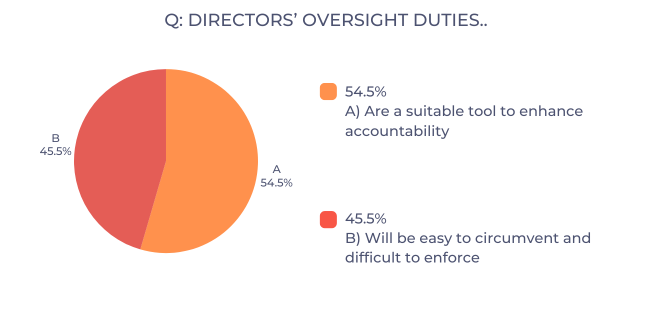CEO Activism
Issue 9 | January 2024
Hello and welcome to the first ECGI In Focus newsletter in 2024!
The start of a new year is also the time for many to integrate some new habits. Whether it's a commitment to healthier eating, increased exercise, carving out time for reading or embracing meditation — similar topics return year after year.
What appears to change is the inspiration for such self-improvement endeavors. Today, CEOs have become a popular source of motivation. Indeed, some CEOs are akin to celebrities, with books dedicated to decoding their lifestyles, and millions attempting to copy their daily routines in the hope of unlocking their secrets to success.
While the CEO as a lifestyle influencer is laughable to many, its more legitimate counterpart, CEO activism, enjoys growing popularity and is less easy to disregard. Numerous CEOs, especially in the US, reinterpret their leadership role and expand it beyond the business operations, voicing their opinion on armed conflicts in foreign countries, LGBTQ+ rights, religious freedom or other divisive political topics.
It is nothing new that business leaders share their views on topics beyond their company’s core business operations, yet the intensity, frequency and range of topics has increased measurably in recent years.
While some CEOs genuinely champion causes close to their hearts, others might be fuelled by the expected positive returns, the public perception of their persona or own political aspirations. Others may feel dragged into the political arena by market forces, investor demands and stakeholder expectations.
More broadly, corporations often entangle themselves in political debates that have tenuous connections to their core business. Like their CEOs, they can be driven by societal polarization and growing demands for corporate positioning by consumers and investors. Boycotts and cancel culture are not only damaging to individuals but are also costly business challenges. By offering consumers an insight into the values they endorse, companies can create a sense of community and loyalty and customers might be willing to pay a premium to support what they perceive as the ‘right’ business. Investors interested in ESG topics may also be attracted to companies that are outspoken on these topics. If a company already possesses an influential platform, why not channel this influence towards a meaningful cause? Some even suggest that there are mutual gains to be made from activist-corporate collaborations.
In their forthcoming paper on corporations stuck in politics, Jill Fisch and Jeff Schwartz highlight the downsides of such corporate political engagement. Corporations may support societal causes, but typically only if they align with the corporate interest or the CEO’s personal values. The companies’ own commitments tend to be superficial and lack operational changes to substantiate their stance. With polarizing statements they may deepen the political divide, instead of furthering the cause with substantive arguments, science or statistics.
Activism is indeed a double-edged sword, as companies can also lose customers and investors if they misread the majority public opinion, miscalculate the response, or appear disingenuous in their endeavors. Constant political posturing could ultimately lead to a divided consumer base and workforce, along with unintended political implications.
Personally, I am somewhat conflicted on this topic. I find it favorable to work for an employer and, as a consumer, use my salary to support companies that do not turn a blind eye to the many injustices in the world. However, the idea that too much corporate activism would eventually lead to a society where employees and consumers self-sort into camps for decisions as small as where to get a coffee, is not very appealing to me. While the concept of ‘voting with your dollar’ advocates for consumer empowerment, it is caveated by the fact that those with more dollars to spend have a much stronger vote. Fisch and Schwartz warn that some corporations may ‘become megaphones for an already-privileged segment of society.’
So, how can we distinguish between corporate activism that is ultimately beneficial for society and that which only divides us further?
I believe we need more focused corporate activism. Rather than taking a stance on every political hot topic, companies could instead redirect their attention to causes more closely related to their business, ones where they possess credibility and can have a tangible impact. Most businesses naturally align with some societal issues, such as diversity and inclusion in their workforce, their own environmental impact, or a specific purpose they embrace.
Instead of condemning a company’s social media silence on the topic of the week, consumers and investors could direct their attention to the company’s operations, be it the treatment of their employees or transparency in their supply chain.
If individuals feel the desire to take a political stance, our voices are heard much clearer on the streets, where every voice has the same volume, than in a shopping center.
I’m curious to hear what you think. Let me know in the poll below.
Cordially yours,
Marleen
MINI POLL

MORE FROM ECGI...
PREVIOUS ISSUES...
In Focus Newsletter
Issue #8 - Does it (still) pay off to pollute? (November 2023)
Issue #7 - Mind the Gender (Eco) Pay Gap (October 2023)
Issue #6 - KPop or Meme Stock (September 2023)
Issue #5 - Exit or Voice? Time to take stock (June 2023)
Issue #4 - Controlling Shareholders (May 2023)
Issue #3 - Practicing Systematic Stewardship (April 2023)
Issue #2 - The Who, What and Why of ESG (March 2023)
Issue #1 - Responsible Capitalism (February 2023)

Marleen Och is a PhD researcher at KU Leuven, Belgium.
She works in the field of sustainable finance and corporate governance, writing about shareholder engagement and sustainability.
Please feel free to get in touch, share your thoughts and let us know how we're doing, email Marleen.Och@ecgi.org and follow us on Twitter at @ecgiorg









